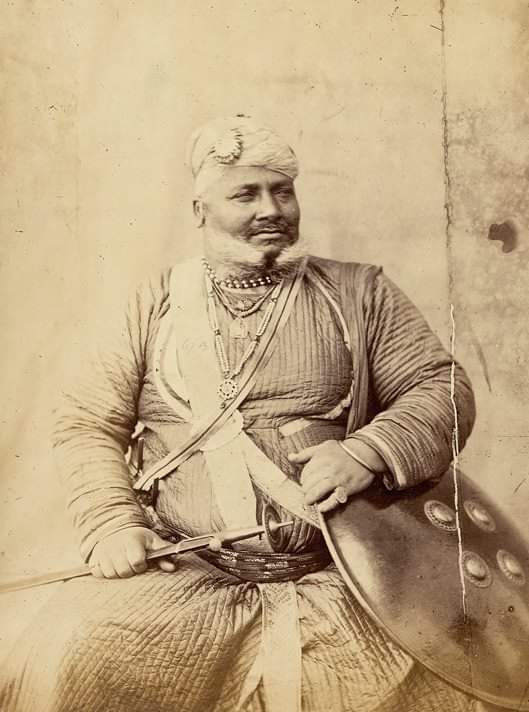Maharao Raja Banni Singh of Alwar died in August 1857, and his only surviving son, Sheodan Singh, a boy of twelve, succeeded to the throne. The administration was in the hands of the Muslim Diwans of Delhi, who also had acquired a great influence over the young Maharao Raja, and their position and conduct gave deadly offense to the Rajputs. The Chief adopted the Mahomedan style of dress and speech and made no secret of his preference for the foreigners. At last, in August 1858, the discontent culminated in an insurrection of the Rajputs, and the Diwans barely escaped with their lives.
Captain Nixon, Political Agent of Bharatpur, immediately proceeded to Alwar. He was met on the border by a body of Rajputs, headed by Thakur Lukhdeer Singh of Bijwar, who had done his best to moderate the proceedings of the insurgents. Captain Nixon found the Chief " in an anguish of rage " with his brethren the Rajputs, whose action was held to have been the consequence of great provocation, and a Council of Administration was appointed, under the presidentship of Thakur Lukhdeer Singh. Captain Impey was appointed Political Agent of Alwar in November 1858. The Dehli Diwans, notwithstanding their reputation as administrators, had failed at least latterly to maintain order, and Captain
Impey found every department in utter confusion, and all his energy and persistency were necessary for the arrangement of affairs. “He had numerous difficulties to encounter in accomplishing this task,” and the young Chief, in spite of his youth, thwarted him to the utmost." The Council of Regency, formed by Captain Nixon immediately after the expulsion of the Musalmans, did not work well and was abolished by Captain Impey, who, after the crisis in 1859, managed for a short time without a Council. A new Council, consisting of five Thakurs, was constituted; but in 1860, to borrow Captain Impey’s words,
‘its corruption had reached such a pitch as to frustrate every hope for even a decent administration.’
Another Council was, therefore, formed, consisting of Thakur Lukhdeer Singh as president, and Thakur Nandji and Pundit Rup Narain as members. This Council carried on its duties in a most satisfactory manner until the Maharao Raja was invested with power on the 14th September 1863." Captain Impey left Alwar about that time, and the Political Agency was shortly after removed. Subsequently, and until 1869, the Governor-General’s agent for Rajputana himself conducted the political business of the British Government with the Alwar Darbar. Under Captain Impey’s direction, justice was well administered, and many other improvements were introduced. Important public buildings were constructed by him, of which a very fine and useful tank, a handsome and commodious court-house, and some important roads, were the principal. When the Maharaja attained to power, Lukhdeer Singh, whom the Chief deprived of one of his villages, left the State, and resided at Jaipur and Ajmir. In 1866 he invaded Alwar with a body of followers, but he met with little success, and had to retire.
The Government of India strongly disapproved his conduct, but, in consideration of the provocation he had met with, and of his previous services, which had been very considerable, an income was secured to him. Contrary to the wishes of the Government of India, the expelled Diwans were permitted to interfere greatly in the affairs of Alwar, where they continued to appoint many officials, and from which they drew a large income. Captain Impey had left more than twenty lakhs in the treasury, but this was soon squandered, and to raise money, salaries were greatly reduced, and grants of various kinds, long enjoyed by their holders, were resumed. Several corps of Musalmans were raised. Fifteen out of eighteen troops of the cavalry which had been employed for generations, and the Khas Chauki, or bodyguard, were disbanded; and in February 1870 another insurrection broke out. Captain James Blair was then Political Agent of the " Eastern States," in which Alwar had in 1869 been included. But shortly after the insurrection had begun, though not before he had exerted himself greatly to repress it, Captain Blair died, and Captain T. Cadell, V.C., was appointed to the Eastern States of Rajputana in his place. He was unable to effect a reconciliation between the Chief and the insurgent Thakurs because the former would not concede
anything; and at length, the Government of India appointed a Council under the presidency of the Political Agent, who then, December 1870, became Political Agent of Alwar, which was separated from the Eastern States.
The Raja was to have a seat at the Board, but not to have the power of vetoing its decisions or interfering in the executive. The members of the Council were four Naruka Thakurs and a Brahman, as follows:-
- Thakur Lukhdeer Singh of Bijwar,
- Thakur Mabtab Singh of Khora,
- Thakur Hardeo Singh of Thana,
- Thakur Mangal Singh of Garhi,
- Pandit Rup Narain, who was before in the Council under Captain Impey.
On the 11th October, Maharao Raja Sheodan Singh, who had long been in weak health, died of brain infection a few days after his twenty ninth birthday. His funeral took place the same day. No disturbance or popular excitement followed the death of the Chief; and as he left no legitimate issue, inquiries were requisite for the determination of the succession
Eventually the Government directed that the claims of the two prominent candidates, Lukhdeer Singh of Bijwar and Mangal Singh of Thana, be referred to the " Barah Kotri," and accordingly the reference was made on the 22nd November 1874.Mangal Singh was installed on throne on 14th December,1874 in preference to Lukhdeer Singh of Bijawar.
